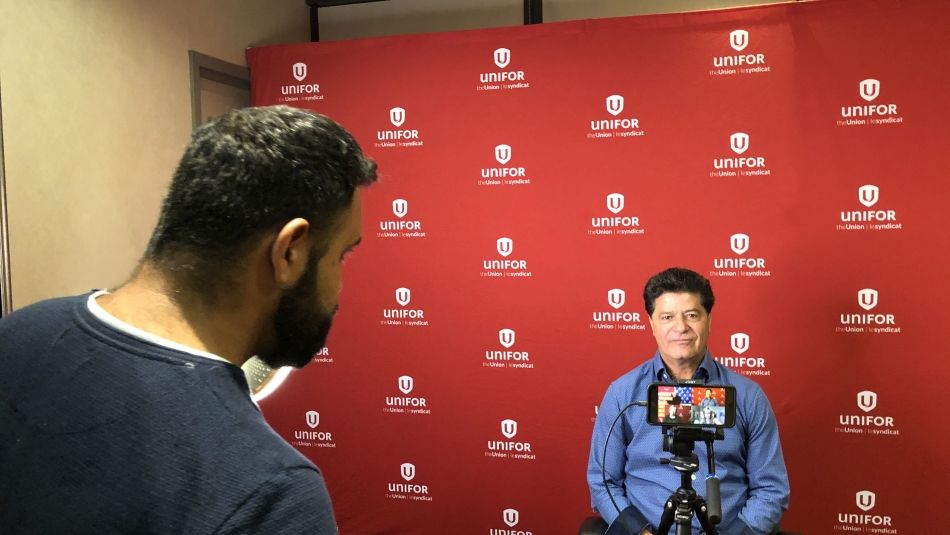
Share
The political ground is shifting and the dialogue is changing Unifor National President Jerry Dias told members in his opening address to begin Unifor’s #BuildBackBetter Summer Summit.
“We are having conversations today that we haven’t had in generations, about expanding the role of government in key industries, about nationalizing key sectors, like long-term care, about living wages, better income security, and improving Employment Insurance (EI) and rebuilding our manufacturing capacity right here in Canada,” said Dias in a speech streamed live on Unifor’s Facebook page.
Dias spoke to the dire consequences of COVID-19 with millions of workers thrown out of work as our social and economic systems failed.
“Many of them fell apart, right when we needed them most,” said Dias, pointing out that only about one-quarter of low-wage workers can access EI. “Our income supports, our social programs all failed due to years of cutbacks and neglect.”
So-called “gig” workers, among the lowest paid and most precarious in the economy, were some of the first impacted with members also hard hit across many sectors including airlines, gaming and hospitality, non-essential retail, media, oil and gas, and manufacturing.
Speaking directly to members in the live online Summit, Dias explained that Unifor has called for improved unemployment benefits and warned about poor quality, precarious jobs for years.
“Nobody’s done a bloody thing. Governments have allowed employers to manipulate our jobs to the point where standards have bent and frayed so badly, there’s barely any stability and security left.”
As workers faced the financial impact of the pandemic, Unifor took action to recalibrate services to members, monitoring developments in our workplaces, increasing online meetings and workshops, and developing resource materials in research, legal, pensions, education and health and safety.
“I’m so proud of the work our union has done, developing safety protocols, advocating on behalf of our members to ensure workers not only are safe, but feel safe.”
The union also maintained constant dialogue with government officials over the last five months, to push them to introduce useful programs, and force them to tighten up failing programs.
“On pandemic pay, on expanded wage subsidies, on extensions to CERB payments, especially for seasonal workers, on fixing EI, we have our fingerprints on all of this because that’s what we do,” Dias told delegates.
Dias also recognized the contributions of members on the frontline of the COVID crisis acknowledging the hard work of those in the health care, personal support, supermarket, food processing, public transit, airline, telecommunications, warehouse and logistics, media, and emergency support sectors among others.
“These heroes literally put their health and safety on the line for the greater good,” Dias said. “Talk about heroic, talk about selfless.”
He stressed that many of these workers are workers of colour, newcomers, women, and young people, all groups that are historically treated as second-class with lower pay and fewer benefits.
“We fought like hell to raise the profile of these workers, and the challenges they face. We demanded government step in to provide higher pay, and then pushed employers to sustain it,” Dias said.
Dias also called for action as we witness the next, most important phase of the civil rights movement, including through Idle No More and Black Lives Matter. He emphasized that Unifor’s work on equity and racial justice must be part of the conversation to steer the country in a better direction.
“There is a reckoning taking place, and the momentum feels much different than in years past. That’s because there can be no more silence. Not from anyone,” said Dias. “Unifor will speak out, loudly, because we have to use our collective voices to make change.”
Dias cited the union’s newly released ‘Road Map for Economic Recovery’ as a blue print for a progressive, inclusive recovery telling members there is cause for hope as we rebuild from the pandemic.
“Look, this crisis is far from over but what this country looks like on the other end of this terrible period is hopeful and inspiring.”
Dias concluded with an eye to the future as he pledged solidarity with the membership.
“We will get through this period together and we will be a stronger union, a stronger nation, on the other side. I know this, because I believe in this union. I believe in the work we are doing. I believe in us.”
View the video of Jerry Dias’ Unifor Summer Summit address here.


